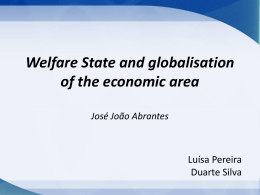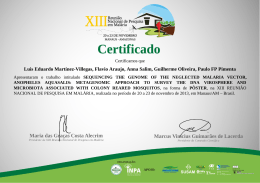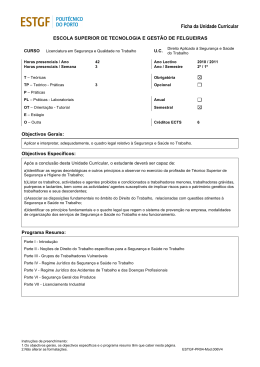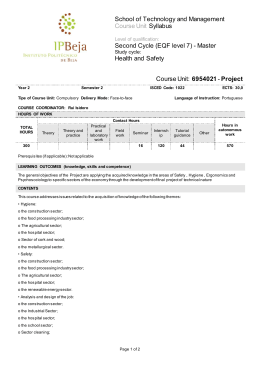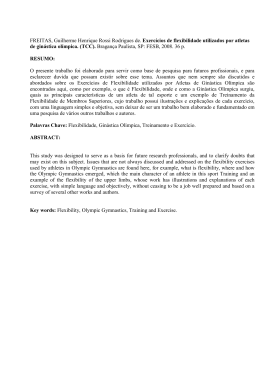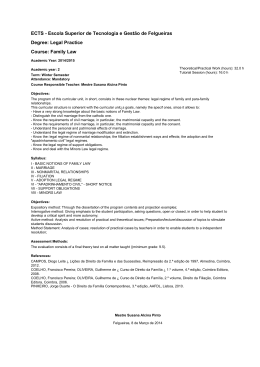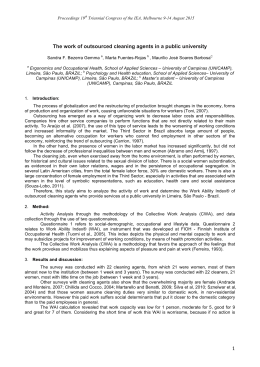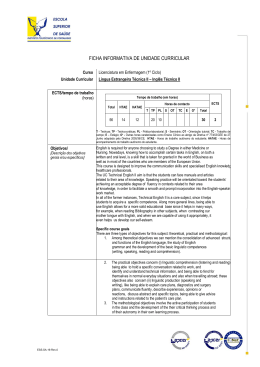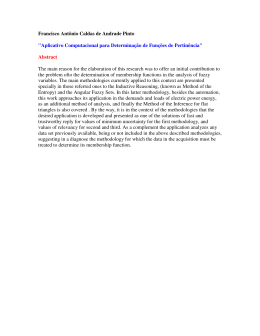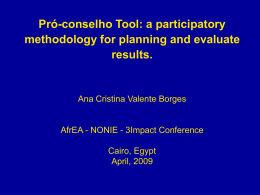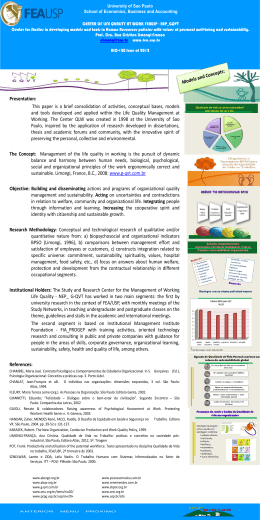SUBJECT DESCRIPTION MODELO PED.013.02 Course Human resources management Subject Labour Law and Social Protection Type of course Year Professor(s) Area Coordinator Academic year 2013/2014 ECTS 6 Compulsory 2nd Semester 1st sem. Maria do Rosário Dolgner Student Workload: Total 168 Contact 128 Maria Manuela Natário Planned 1. LEARNING OBJECTIVES Make students aware of the evolution, the content and the legal concepts of Labour Law, as well as generically approach some legal aspects related to social protection. The objective is also, through the given contents and methodology, to provide students with tools that allow them to solve questions resorting to the applicable legislation. 2. PROGRAMME I-INTRODUTION TO THE LABOUR LAW 1- Object, ambit and notion of Labour Law 2- Formation and evolution of Labour Law 3- The sources of Labour Law II-The employment contract 1- The employment contract: notion, essential features and juridical characterisation 2- Employment contract and provision of services contract: differences 3- Contracts equated to employment contracts. 4- The formation of the employment contract: processes and assumptions 5- The invalidity of the employment contract 6- The probation period 7- Powers and duties of the employer 8- Rights, duties and guarantees of the employee 9- The object of the providing of employment (?) 10- Duration and organisation of labour time 11- The different variations of an employment contract: fixed term, temporary, part-time, intermittent, comission of service and teleworking. 12- The cessation of the employment contract: general considerations and variations. III-THE SOCIAL PROTECTION 1-Introdution – general aspects 2-The protection during and after the cessation of the labour relation 3-The general contributory regime of employees Página |1 SUBJECT DESCRIPTION MODELO PED.013.02 3. COHERENCE BETWEEN PROGRAMME AND OBJECTIVES As the main objective is to provide students with knowledge related to the evolution of Labour Law and the fundamental concepts of the same branch of Law, and also some concepts in the area of social protection, all contents expressed in the several topics (I to III) are in agreement with the defined objectives, as they deal with the previously referred evolution and with the previously mentioned fundamental concepts, as the one which concerns the evolution of Labour Law (I), the employment contract (II), and the social protection (III). The objective of the practical resolution of problems in this area is reached through the methodologies that will be used. 4. MAIN BIBLIOGRAPHY COMPULSORY BIBLIOGRAPHY -AMADO, João Leal, Contrato de Trabalho, Coimbra Editora, 2013. -Código do Trabalho -Lei de Bases da Segurança Social -Código dos regimes contributivos do sistema previdencial de segurança social RECOMMENDED BIBLIOGRAPHY -QUINTAS, Paula e QUINTAS, Hélder, Manual de Direito do Trabalho e de Processo do Trabalho, Almedina. - LEITÃO, Luís Manuel Teles de Menezes, Direito do Trabalho, Almedina, 2012 - FERNANDES, António Lemos Monteiro, Direito do Trabalho, Coimbra, Almedina,2012. -GOMES, Júlio Vieira, Direito do Trabalho, Coimbra Editora, 2007. 5. TEACHING METHODOLOGIES (INCLUDING EVALUATION) Teaching Methodologies: -Expository method -Interrogative method -Case study based on judicial decisions -Resolution of problems Evaluation rules -A frequency exam (100%) -Examinations (normal period and special period). One will get approval in the curricular unit by having the minimum grade of 10. Página |2 SUBJECT DESCRIPTION MODELO PED.013.02 6. COHERENCE BETWEEN TEACHING METHODOLOGIES AND OBJECTIVES The objectives related to the acquisition of knowledge about the evolution of Labour Law, the basic concepts previously mentioned, will be reached using the methodologies previously indicated, namely through interrogative and expository methods, on a first approach. The objective related with the resolution of real situations in the future will be reached through the practical application of concepts through the resolution of practical cases and study cases, which goes through the knowledge of the legislation in force and the study of judicial decisions. 7. CONTACTS AND OFFICE HOURS Email: [email protected] TM: 918763005 Office nº 18 da ESTG Office hours: Monday from 14.30 to 17.30 hours. Date: Signature: Signature: Area Coordinator Professor Página |3
Baixar
